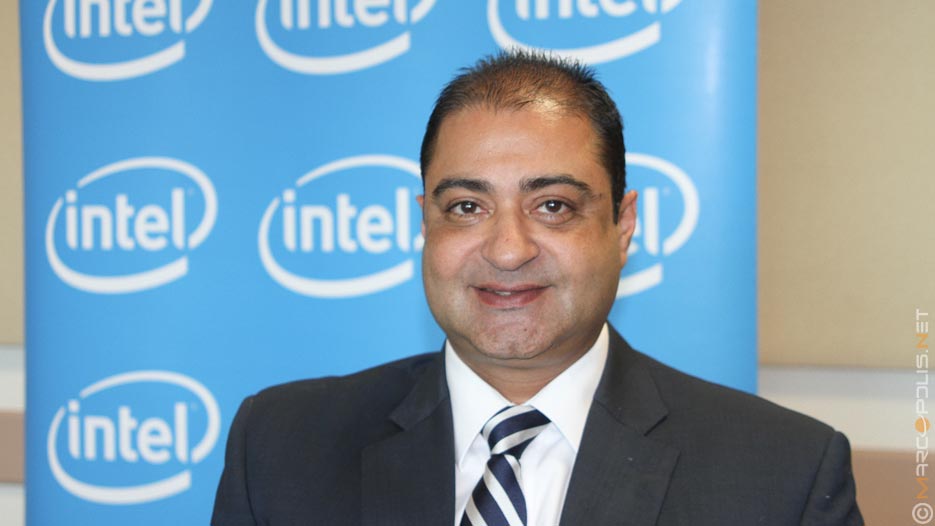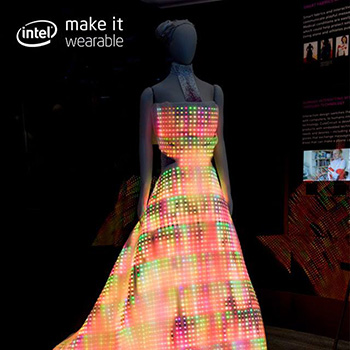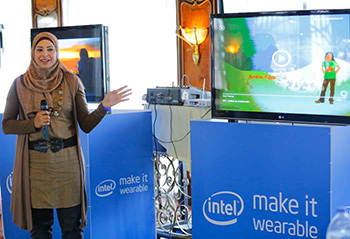IT potential of Egypt & Intel’s commitment to Egyptian market
“Intel, Egypt is committed to the Egyptian market thought our “Egypt tomorrow” initiative. We are here to stay. We are confident about the potential of the Egyptian market. Our strategy is aligned around the three main areas of education, innovation and entrepreneurship,” notes Karim El Fateh, Country Manager (Egypt & Levant) of Intel Corporation.
Interview with Karim El Fateh, Country Manager (Egypt & Levant) of Intel Corporation

Could you give us your general overview of the IT sector, some figures regarding the market penetration, the number of PC users and other essential characteristics of the sector?
According to IDC forecasts, worldwide IT spending will grow 5% year over year to $2.1 trillion in 2014. Emerging markets will return to double-digit growth of 10%, and, for the first time, more than 60% of worldwide IT spending growth. Technology plays an important role in the Egyptian market. Technology is the driving force for economic and social growth for Egyptians. PC penetration is still low, but the number of internet users in Egypt is increasing. According to the eMarketing Egypt Online Competitiveness Intelligence report, Egypt’s Facebook community witnessed about 41% growth compared to 2012, the number of users in 21 July 2012 being 11.3 million. This means that the current number of users is 18.84% of Egypt’s population. According to official figures, internet penetration in Egypt reaches to 43% at the end of Q2 2013, compared to 38 percent in 2012, which shows that there is much more potential in the Egyptian market for PC penetration. There is a correlation between broadband penetration and PC penetration. That’s why in Intel we are focused on three areas. One of them is education, the second is innovation and the third is entrepreneurship. These three pillars represent the “Egypt tomorrow” initiative.
Please tell us the story of Intel, Egypt. How long have you been present in the country? What is your aim and strategy?

Intel was started in 2001. Since then, we have been working across many different areas. Intel, Egypt is committed to the Egyptian market thought our “Egypt tomorrow” initiative. We are here to stay. We are confident about the potential of the Egyptian market. Our strategy is aligned around the three main areas of education, innovation and entrepreneurship. We believe that technology can bring a brighter future to Egypt.
Can you mention some of the educational initiatives? Can you share some of the success stories?
Education is one of the first areas, where Intel established a presence in Egypt as it is a driving force for the economic and social development of the country. We have invested more than a billion dollars in educational programs globally. Technology plays a key role in equipping teachers and students with the skills necessary to succeed in the workforce and beyond. Through the Intel teach program, Intel aims to improve teacher effectiveness through professional development, helping teachers integrate technology into their lessons. Currently, more than 550,000 teachers have been trained in Egypt.
We also have a program called “Intel Learn”. Intel launched its Intel Learn program in Egypt in 2005. Intel Learn is an after-school, community-based program designed to teach technological literacy, problem solving and collaboration skills—essential skills for success in today’s knowledge economy. We have trained more than 250,000 students in Egypt. We have a lot of success stories that we can talk about later in terms of how Intel Learn has made a difference in the community. We have also donated 8,000 student PCs to Egyptian schools as a part of our initiative to demonstrate how technology can be utilized in the classroom.
Through the Intel teach program, Intel aims to improve teacher effectiveness through professional development, helping teachers integrate technology into their lessons. Currently, more than 550,000 teachers have been trained in Egypt.
On top of those programs, we have also been engaged with the Minister of Education, Minister of Scientific Research and Minister of ICT in implementing a project called ‘millennium project’. This project was part of UNESCO worldwide education initiatives to provide students access to technology. Egypt was one of the countries that was able to enroll in this worldwide initiative. We have so far equipped 6,000 students with Intel devices, Intel classmate PCs. This number will reach 11,000 students in 20 schools. On top of that, there would be teacher’s training as a part of this pack. So, education is definitely an area where Intel is committed to provide all the tools, all the know-hows and resources to make it a success and sustainable in the future.
What are the challenges of doing business in Egypt?
The Egyptian market is split between the consumer and the commercial business. In Egypt, close to 77% of the market is dominated by consumer business. Intel plays a big role in working with our partners in providing products suitable for the Egyptian market. These products could either be a portfolio of products such as Ultrabook 2 in 1 – all those different devices that help people do their work or play or any kind of activities they are looking for. We work with the local manufacturers as well—to make products available in the local market from local manufacturers. So, we have already launched a couple of tablets with local players, carrying local brands. These products are available in retail across Egypt, too. All in all, the consumer segment is quite large. There is a big demand.
We are striving to find a way to reach the first-time buyers. One of our programs is to actually to reach those people that desire a computer, but cannot afford it, through clear messaging, clear value propositions, a low cost high performance device using the best  Intel technology connectivity to be a part of this package, providing content, because at the end of the day, people now use computer to do something of it. And to try to make all this affordable through financial schemes. Again, we are back to the question, why we are producing it in the market. It has a huge potential, huge opportunity. There are a lot of first-time buyers. And through this program, Intel strives to reach those first-time customers.
Intel technology connectivity to be a part of this package, providing content, because at the end of the day, people now use computer to do something of it. And to try to make all this affordable through financial schemes. Again, we are back to the question, why we are producing it in the market. It has a huge potential, huge opportunity. There are a lot of first-time buyers. And through this program, Intel strives to reach those first-time customers.
What would be your short-term strategy for 2014/2015? Are you looking for any partnerships locally? What is your plan?
Our short-term and long-term plan falls under the ‘Egypt Tomorrow’ initiative that we defined in 2011. This initiative has those three main pillars, which is education, innovation and entrepreneurship. Within each one of those pillars, we put programs in place and we start working with different partners to make this strategy come to life. In terms of working with local partners, our main work is to create local brands, especially in the tablet area. Tablet, as you probably know, is the fastest growing market segment in the world. In the Middle East North Africa Region, it’s estimated to be growing more than 50% annually. In Egypt, it’s estimated to be growing by 70% annually. Mostly, if you look at the pattern of how this device market is designed, almost 50% of this tablet market is coming from local brands or no brands, where people pay an affordable price to get a good device. So, when customers see the Intel logo next to a local logo, they feel assured that this is a good product. Thus, this is a huge market potential and by working with our partners in the local market, we make sure that we address that potential. Also, we work with our multinational partners, with brands such as HP, IBM, Novell, Dell, to make sure they bring the right products to the market. We work very close to them in choosing the right product. We create the right environment for customers to purchase Intel-based products. We also work a lot with the government on different initiatives, such as all the education programs, Minister of Communication and IT and we work with a lot of NGOs to make these programs happen as well.
What will be your personal vision for Egypt as a country moving forward?
Intel in Egypt is committed to the market. We are here to stay, because we do see a potential for Egypt. Egypt is centrally located between all the different regions – Africa, Asia and Europe. It is strategically located. We do have a good set of knowledge and skills available with the Egyptians. There is a good pipeline and candidates of potential innovators and entrepreneurs. One of the areas that we are focused on is looking at all those young talents. One of the programs that I forgot to mention is ISEF, which is Intel Science and Engineering Fair, where we start working with the young students up to the age of 18 on scientific research. We have managed to work with a lot of teens, students in Egypt, until we have finalists that go and represent Egypt in the Intel ISEF. Therefore we work with that age group and we see a lot of great potential, you know young innovators in that age group. We also work with universities in terms of innovation and entrepreneurship and again we do see a huge potential in Egyptian students with regards to innovation and entrepreneurship. There is a huge potential in Egypt. Technology can play a big role in our growth and development and we see that with technology there can be a brighter future for Egypt and we are going to continue focusing on Education, entrepreneurial innovation and infrastructure.
What would be Intel’s future in Egypt?
In terms of the future, Intel is providing products all over the computing space. If it computes, it runs better on Intel. One of the areas that has potential in the future is ‘the Internet of things’, where everything is going to be connected to the internet. A big part of the ‘the Internet of things’ is the “wearables”. Intel in 2014 announced some new products and innovations built on our new processor Edison, which enables production of gadgets and devices that are wearable and can be connected to the internet. What Intel is doing now is taking this forward. By creating competitions and working with the innovators of the world, Intel started a competition called “Make it wearable competition” among 27 countries and Egypt is the only country in the MENA Region participating. It is divided into 2 tracks: visionary track which is giving us an idea and development track which is making your dream come true through developing a product. This competition is all about creativity. Just let your imagination flow free. Give us ideas on what can be achieved through wearable technology. One of the Egyptian candidates submitted a proposal and got the third place in this competition’s first track. Her idea focused on clothes that breathe by using a certain type of fabric aimed at absorbing human sweat and carbon dioxide to create oxygen.
FAIR USE POLICY
This material (including media content) may not be published, broadcasted, rewritten, or redistributed. However, linking directly to the page (including the source, i.e. Marcopolis.net) is permitted and encouraged.